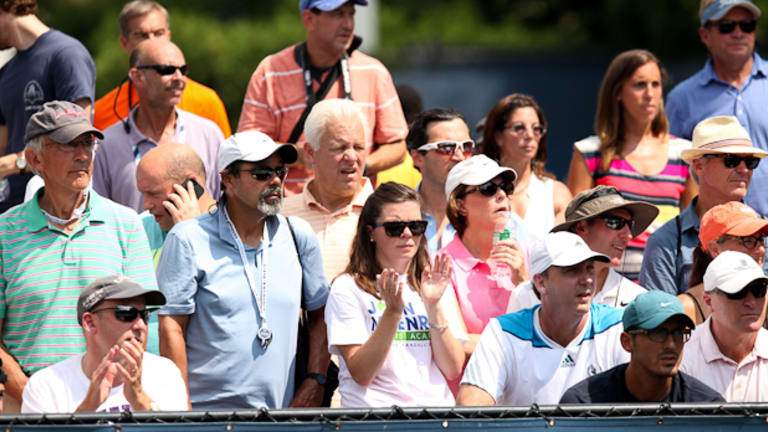NEW YORK—The most remarkable thing about Noah Rubin when he walked on court for his first match at the U.S. Open on Tuesday was how unremarkable he looked. At a wiry 5’9”, and weighing in at the the proverbial “buck fifty”—150 pounds—Rubin appeared suspiciously like a normal person as he began his warm-up. From a physical standpoint, "normal" is not a good thing in tennis at the moment. One look across the net at Rubin’s opponent, Federico Delbonis, told you why. The 23-year-old Argentine is listed at 6’3”, 194 pounds, but he appeared much more hulking than that. Yet Delbonis is just par for the course on the ATP tour in 2014. Walking around the player lounge at a tournament these days is like walking among a new, very large and very tan, super-race.
Today Rubin, an 18-year-old from a town down the road on Long Island, got a taste of what life will be like as he tries to evolve and join that race. He may not have the size, but he does have the tan. That could be because it’s been a long and stunningly fruitful summer for this student at John McEnroe’s academy in New York. Rubin surprised the junior tennis world last month when, unseeded, he became the first American since Donald Young in 2007 to win the Wimbledon boys’ title—beating, along the way, two highly touted U.S. kids, Francis Tiafoe and Stefan Kozlov. A month later, Rubin proved that run was no fluke by winning the 18s title at Kalamazoo. With that, he earned the wild card that landed him on a crowded and humid Court 13 at the Open today, for his second career ATP match. This was bound to be, as they say, a teachable moment.
It took less than a minute for the boy’s world to collide head on with the man’s. Delbonis, ranked No. 66 and with a win over Roger Federer to his name, may appear larger than he’s listed because everything about his game is oversized, from his too-high ball toss to his windmill backswing on his forehand. And the first few serves and forehands that Delbonis hit must have felt oversized to Rubin. For three games, Rubin struggled just to find the time to take a full cut at the ball. He was lunging, leaping, and reflexing every ball that rocketed toward him. After the second point of the match, Rubin took a few extra seconds to bounce the ball at the back of the court as he prepared to serve. It was obvious he needed to recalibrate right away.
“It’s completely different sports,” Rubin, currently ranked No. 585, would say later when asked about the differences between the pros and the juniors. “The pros, they’re doing it for a living. Been out here for so long. The experience is at a different level. Fitness is at a different level.”
Rubin would eventually find a little more time to take his cuts, and he would find his way into the match. His father, Eric, a banker and tennis nut who was cheering “That’s it, Noah!” from the second row whenever he had the chance today, says that his son’s biggest asset is his head, and his ability to find ways to win—Noah, after all, has been playing more powerful opponents his whole life. And you could see his upsides today, even in defeat. Rather than panicking, Rubin took his time and did his best to adjust. He showed that he could knock off a few two-handed backhand winners, when he had the time to move into the ball. And he showed the skill that had likely won him hundreds of junior matches: Rubin knows how to stay within himself. When he had success today, he did it by giving Delbonis a chance to beat himself.
